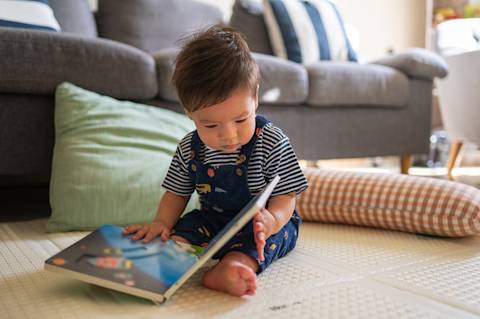You can’t avoid it anymore: the dreaded grocery store visit. If you associate the grocery store with meltdowns and temper tantrums, you’re not alone. From the bright lights to the unfamiliar surroundings and the variety of colorful packaging, the grocery store can be stimulation overload for children, leading to increased stress and frustration. But we have some ideas to make your next visit a little bit easier.

The grocery store is packed with lights, sounds, smells, and so many different experiences. This can be overwhelming for children and make it hard to process what’s going on. Because they don’t always have the words to describe what they’re feeling, they might act out or throw a tantrum. Emotional responses can be even stronger when children are tired or hungry, if they feel like they’re being ignored, or if they’re bored.
While it may be hard to avoid grocery store meltdowns completely, here are some actions you can try to help make grocery shopping easier and less stressful for both you and your child:
If you can, plan ahead to help make your trip as efficient as possible. Make your grocery list and organize it by the different areas in the grocery store to avoid having to go back to the same area more than once. For example, plan to get all your produce at the same time.
If possible, try to visit the store during non-peak hours when it’s not as busy. Going to the store when there are fewer shoppers can reduce the amount of stimulation your child experiences, and it can make your trip go quicker, as you’ll likely have shorter lines and fewer people to navigate around.
Make sure your child is well-fed and well-rested before you go. A hungry and tired child is much more likely to have an emotional response. You can try buying a snack for your child at the store so they can eat while shopping.
Before you go, do your best to set clear expectations and rules. To make it more fun, try role-playing the grocery store visit at home!
Pack a few surprise toys in your bag. An unexpected toy can be a good distraction if your child starts to show signs of getting frustrated or fussy.
Once you and your child get to the store, try out these ideas to keep your child engaged and motivated to follow your rules and boundaries:
Giving them a simple responsibility can help them feel more independent and in control of the trip. Ask their opinion on a choice between two different options. Give them the task of crossing things off the list once they’re in the cart. Challenge them to count the items in the cart and identify shapes.
Some children are motivated by rewards or incentives for good behavior. You can try promising a snack they love as a treat after the shopping trip if your child behaves well. Offer to do a fun activity together once you get home, such as a favorite game, art project, or a family walk.
Praising your child for good behavior with words and affection can be a strong incentive for them to continue behaving well. Children often hear what they can’t do or what they shouldn't do. Recognizing good behavior can increase their confidence and encourage them to keep behaving well.
When you start to notice signs of frustration or agitation, try to redirect your child, or engage them in a more positive activity that captures their attention and focus. Games like “I Spy” can be a great distraction for them while allowing you to continue your shopping.
Being a caregiver is both an incredible journey and a difficult one. Your child will likely still have outbursts at the grocery store occasionally, and that’s OK! It’s important to be patient with yourself and recognize that you’re doing your best. If you’re feeling overly frustrated or overwhelmed, you can always take breaks by taking your child out to the car for a few minutes and returning. Or you can try the store again another day. If possible, you can also try a grocery delivery service like Instacart or Postmates.






